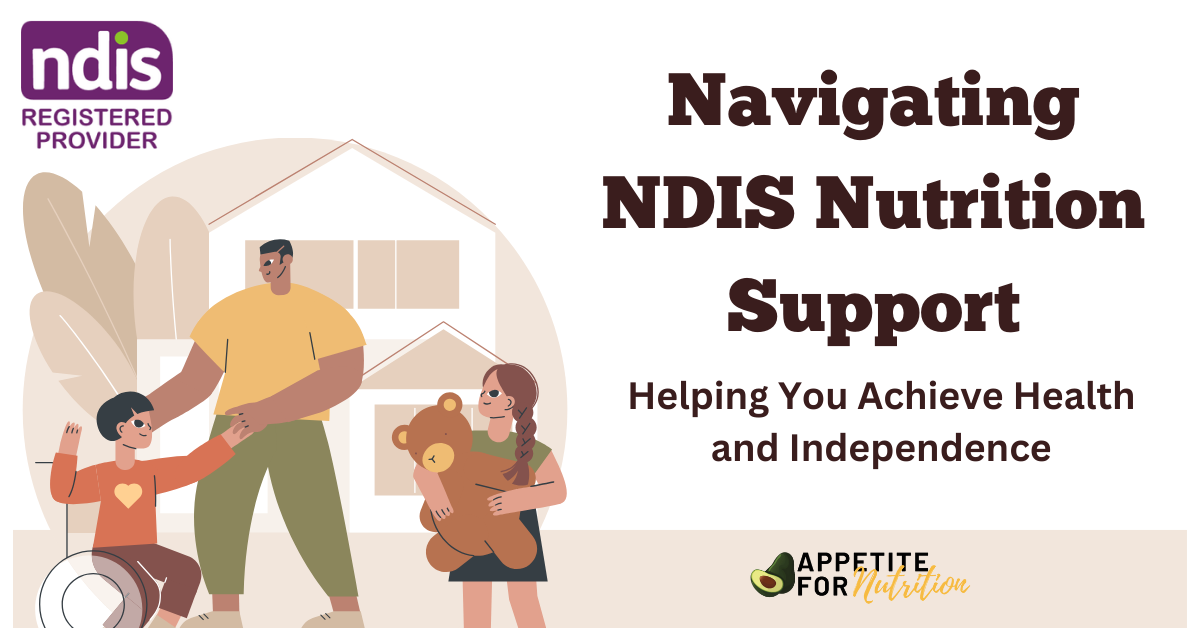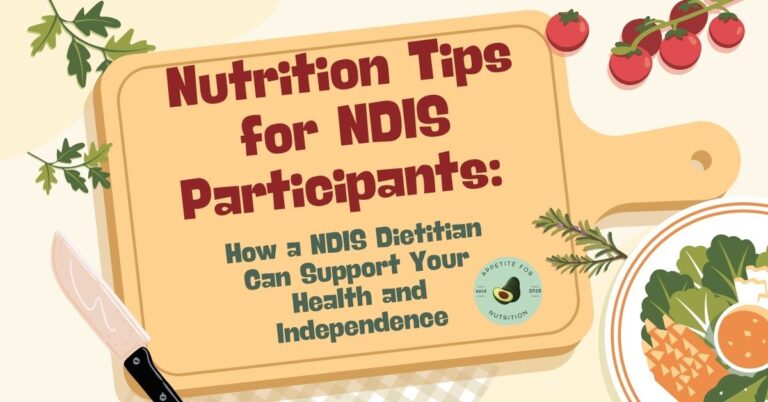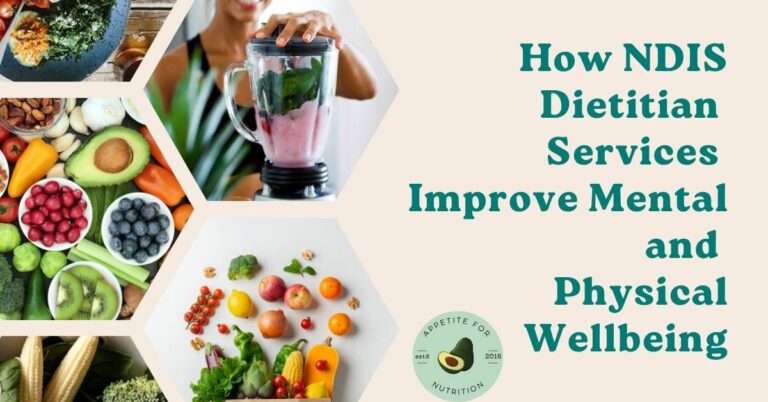
Navigating NDIS Nutrition Support: Helping You Achieve Health and Independence
For individuals living with disabilities, accessing proper nutrition can be a cornerstone of health and well-being. The National Disability Insurance Scheme (NDIS) provides a pathway to nutritional support tailored to individual needs, helping participants achieve better health outcomes and greater independence. This guide will walk you through the essentials of NDIS nutrition support, including eligibility and benefits, and how a NDIS dietitian can help you on your journey to better health.
What is NDIS Nutrition Support?
NDIS nutrition support involves working with accredited dietitians to address the unique dietary needs of individuals with disabilities. This service can include:
- Personalized meal plans and goal setting to meet specific health needs and preferences.
- Guidance on texture-modified diets or feeding tube management for individuals who have difficulty swallowing or require alternative feeding methods.
- Assistance with overcoming selective eating or sensory-related food challenges for those with autism spectrum disorder (ASD) or sensory processing issues.
- Education on shopping, cooking, and food preparation for greater independence, particularly for individuals with intellectual disabilities or physical limitations.
To learn more about our NDIS dietitian services, click here.
Common NDIS Conditions and How a Dietitian Can Help
Different conditions often require unique nutritional approaches. This guide will walk you through the essentials of NDIS nutrition support, including eligibility and benefits, and how a NDIS dietitian can help you on your journey to better health.
1. Autism Spectrum Disorder (ASD)
- Functional Outcomes: Improved acceptance of foods, decreased anxiety around mealtimes, and more variety in diet.
- How a Dietitian Can Help: Address sensory food issues, support with food aversions, and promote healthier eating habits. A dietitian can also help create visual meal plans for greater structure.
2. Down Syndrome
- Functional Outcomes: Improved digestion, enhanced energy levels, and better weight management.
- How a Dietitian Can Help: Focus on managing common issues like constipation, overweight, and undernutrition. A dietitian can provide tailored meal planning that meets caloric and nutritional needs, as well as support in choosing appropriate foods that improve digestion.
3. Cerebral Palsy
- Functional Outcomes: Better coordination of swallowing, improved muscle strength, and maintenance of healthy weight.
- How a Dietitian Can Help: Modify textures for easier swallowing and help with feeding tube management. A dietitian can also offer advice on calorie-dense foods to support optimal nutrition if muscle atrophy or undernutrition is a concern.
4. Intellectual and Developmental Disabilities
- Functional Outcomes: Increased independence in food preparation, improved self-care skills, and better dietary choices.
- How a Dietitian Can Help: Educate on easy-to-follow meal planning, nutrition basics, and cooking skills, all aimed at boosting confidence and independence in meal preparation.
5. Acquired Brain Injury (ABI)
- Functional Outcomes: Enhanced cognitive function, reduced fatigue, and improved appetite and eating patterns.
- How a Dietitian Can Help: Address appetite changes and food sensitivities that can arise post-injury, ensuring the individual receives adequate nutrition to support brain function and recovery.
6. Multiple Sclerosis (MS)
- Functional Outcomes: Increased energy, better management of symptoms like fatigue and weight loss, and improved immune function.
- How a Dietitian Can Help: Provide tailored meal planning to support energy needs, reduce inflammation, and maintain a healthy weight. Specific nutrient support, such as high-protein or anti-inflammatory foods, can also be beneficial.
7. Sensory Processing Disorders (SPD)
- Functional Outcomes: Reduced mealtime distress, improved food acceptance, and greater dietary variety.
- How a Dietitian Can Help: Offer strategies for incorporating more textures and flavors into meals and creating sensory-friendly meal routines that reduce anxiety.
8. Feeding Tube (Jejunal or Gastric) Management
- Functional Outcomes: Proper tube placement, optimal calorie and nutrient intake, and prevention of feeding tube-related issues.
- How a Dietitian Can Help: Assist with appropriate formula selection, tube feeding schedules, and troubleshooting complications like aspiration or discomfort.
To find out more about the types of clients we support, click here.
When Do You Need a Dietitian?
Dietitian support may be beneficial in the following situations:
- Difficulty eating or drinking due to medical conditions or disabilities (e.g., swallowing difficulties, feeding tube management).
- Unbalanced diet that impacts health, including poor weight management or inadequate nutrient intake.
- Dietary restrictions resulting from conditions like allergies, intolerances, or sensory processing disorders.
- Behavioural feeding issues, including selective eating, food refusal, or sensory challenges.
How to Access NDIS Nutrition Services
- Identify Your Needs: Start by discussing your nutritional challenges with your support coordinator or NDIS planner. Document how these challenges affect your daily life and overall health.
- Include Nutrition in Your Plan: During your NDIS planning meeting, specify your goals related to nutrition, such as maintaining a healthy weight, managing a medical condition, or gaining skills to prepare meals.
- Work with a NDIS-Registered Dietitian: Choose a dietitian experienced in working with NDIS participants. They can:
- Conduct a thorough assessment of your needs.
- Develop a tailored plan to help you meet your goals.
- Provide ongoing support to ensure progress.
- Utilize Your Funding: Your dietitian’s services can be funded through your NDIS plan. Ensure your chosen provider understands NDIS billing processes and can help you make the most of your allocated funds.
To make a referral, click here.
Benefits of NDIS Nutrition Support
- Improved Health: Proper nutrition plays a critical role in managing many conditions, addressing symptoms like fatigue, poor digestion, or low immunity. A healthy diet can also improve mental health by reducing stress and enhancing mood stability.
- Greater Independence: Nutrition support empowers participants to take control of their dietary needs by teaching skills such as meal planning, grocery shopping, and cooking. Participants gain confidence in preparing meals that suit their tastes and nutritional requirements, enabling them to lead a more autonomous life.
- Enhanced Quality of Life: A well-balanced diet contributes to increased energy levels, sharper focus, and greater participation in social and physical activities. Achieving nutritional goals often enhances overall satisfaction, self-esteem, and a sense of accomplishment.
Dietitians can also provide caregivers with valuable tools and resources to support participants, reducing stress and promoting a team-oriented approach to nutritional care.
Tips for Getting the Most Out of NDIS Nutrition Support
- Set Clear Goals: Be specific about what you want to achieve, whether it’s better health, more independence, or improved eating habits.
- Communicate Openly: Share your preferences, challenges, and progress with your dietitian to ensure the plan stays effective.
- Stay Committed: Consistency is key to achieving lasting results.
NDIS nutrition support can be life-changing for participants seeking to improve their health and independence. By understanding how to access and utilize these services, you can unlock the benefits of personalized dietetic care tailored to your unique needs.
This blog was last updated October 2025.
Frequency Asked Questions
Find quick answers to common questions
Our team of NDIS-registered dietitians helps clients make practical, evidence-based food decisions that fit their goals, lifestyle, and budget.
A NDIS dietitian supports individuals with disabilities to achieve their nutrition and health goals. They assess dietary needs, create tailored meal plans, and work with participants, families, and carers to improve nutrition, independence, and overall wellbeing. Dietitians often collaborate with Occupational Therapists (OTs), Speech Pathologists (SPs), and support coordinators as part of a multidisciplinary care team.
Any NDIS participant who has nutrition-related challenges — such as difficulty eating, managing medical conditions, food aversions, or unbalanced eating patterns — may be eligible for dietitian support. Nutrition services are typically funded under Capacity Building – Improved Daily Living or Improved Health and Wellbeing categories of an NDIS plan.
NDIS dietitians support participants with a wide range of conditions, including:
Autism Spectrum Disorder (ASD)
Cerebral Palsy
Down Syndrome
Intellectual or developmental disabilities
Sensory processing disorders
Feeding difficulties or tube feeding
Diabetes, coeliac disease, or gastrointestinal issues
Weight management and appetite challenges
They also help manage nutritional needs associated with neurological or physical disabilities.
Dietitians, OTs, and SPs work closely to ensure participants receive safe, effective, and enjoyable mealtime experiences:
Speech Pathologists assess and manage swallowing safety.
Occupational Therapists support posture, motor skills, and adaptive equipment for independence.
Dietitians ensure meals are nutritionally adequate, enjoyable, and tailored to individual needs.
This collaboration ensures holistic, person-centred care for every participant.
You can access NDIS dietitian services by:
Discussing your nutrition-related goals with your NDIS planner or support coordinator.
Including nutrition support under “Improved Daily Living” or “Improved Health and Wellbeing.”
Choosing an NDIS-registered dietitian, such as those at Appetite for Nutrition, who can complete assessments, create meal plans, and provide reports for plan reviews.
Our team offers both in-person consults (in Brisbane, Gold Coast, Melbourne, Shepparton, Bendigo, and Albury-Wodonga) and telehealth appointments Australia-wide.
Yes. Dietitians can manage tube feeding schedules, recommend appropriate formulas, and ensure adequate calorie and nutrient intake. They also design texture-modified diets for individuals with chewing or swallowing difficulties, ensuring meals are safe and nutritionally balanced.
Working with a dietitian can help participants:
Improve energy, mood, and concentration.
Manage chronic conditions more effectively.
Develop independence with food preparation.
Reduce mealtime stress for participants and carers.
Achieve long-term health goals through practical, evidence-based nutrition strategies.
Set clear goals, stay consistent with appointments, and communicate openly with your dietitian about your challenges and progress. Nutrition improvements take time, but small, steady changes can lead to lasting health and lifestyle benefits.
Yes. Our NDIS-registered dietitians offer customised meal plans tailored to medical conditions, preferences, and functional needs. We also provide resources for carers, practical guides, and ongoing support to help participants eat well and live more independently.
You can book a consultation or make a referral directly through Appetite for Nutrition.
info@appetitefornutrition.com.au
www.appetitefornutrition.com.au
Our friendly team will guide you through the process, help you make the most of your funding, and match you with the right dietitian for your goals.



